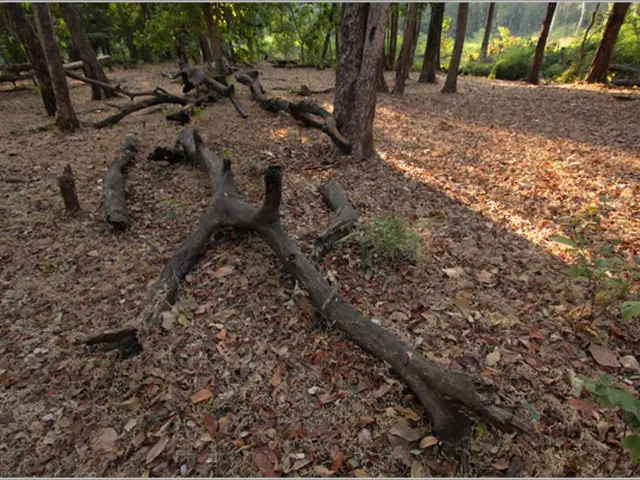Saving Up for Your Dream Vacation: Strategies and Best Practices
Strategies for saving money for a trip to Kazakhstan, including potential risks, and expert advice from a financial consultant.
Taking a well-deserved break is essential, but saving for that vacation can be challenging. Here's a breakdown of popular methods, their pros and cons, and a few expert tips.
Stashing Away Your Travel Funds
Keep cash at home, and it's readily available for your adventure. However, this method comes with risks. Your hard-earned money may lose its value due to inflation, and it could easily get misplaced or stolen. Prioritizing a secure savings method is essential if you're stashing cash.
Debit cards offer more flexibility and make transactions a breeze—especially if your bank offers interest on your balance. However, the convenience could encourage you to spend your vacation savings on everyday expenses.
Optimal Short-Term Savings Solutions
Savings accounts and replenishable deposits are typically considered the go-to options for short-term savings. They allow you to earn interest, protecting your savings from depreciation. According to data from the Agency for Regulation and Development of the Financial Market, the average effective interest rate on these products in Kazakhstan is around 13-16% per year.
Investing in the stock market, bonds, or precious metals might seem appealing, but these tools are not suitable for goals with a term of less than a year without sufficient experience.
Vacation Budget Guidelines
Financial consultant Aaman Alimbayev recommends that a reasonable vacation budget should equate to about 5-10% of your annual income. So, for an annual income of 8 million tenge, your vacation budget should be between 400,000 and 800,000 tenge. Spending more than 15% of your income on vacation, especially without adequate savings for unexpected expenses, may indicate a need to reevaluate your financial priorities.
Savings Methods and Strategies
If your vacation is scheduled well in advance, taking advantage of early booking programs can be beneficial. These programs allow you to pay part of the cost upfront and the rest in installments, securing the cost of touring or accommodation and safeguarding against price fluctuations.
Another strategy is to save a fixed amount each month. Automatic transfers to a savings account are efficient for this, as they help maintain discipline and reduce the risk of early spending.
If you struggle to save on your own, limiting your access to funds can be helpful. For example, placing your savings in a deposit with no partial withdrawal option can encourage responsible spending habits.
Calculating Your Vacation Savings Plan
Let's look at an example for a family of three planning a vacation:
- Family: 3 people (mom, dad, child)
- Total monthly income: 900,000 tenge
- Planned vacation destinations: Vietnam, Thailand, or Egypt
- Average vacation cost per person (7 days): 400,000 tenge, totaling 1,200,000 tenge for the family.
- Additional expenses budget: 500 USD (517 tenge)
- Percentage of income the family can save monthly: 10%
Option 1: Simple Savings (without using a deposit).
By saving 90,000 tenge monthly, the required time will be approximately 16 months.
Option 2: Savings Account at 15% per annum (with monthly capitalization).
By depositing monthly savings (90,000 tenge) at 15% per annum with monthly capitalization (i.e., 1.25% per month), the savings amount of 1,458,500 tenge will be reached in about 15 months.
What to Do if Savings Are Not Achieved...
In the face of unforeseen circumstances, it's important to remain flexible. Inessa Budaeva, a tourism industry specialist, suggests considering the use of a credit card with a grace period, but this should be an exception rather than a rule. A vacation should bring pleasure, not become a cause of debt burden.
Previously, we wrote about Kazakhstan's vacation laws and entitlements to vacation days and vacation pay (source: RK laws).
I, considering a dream vacation, am exploring various savings methods to ensure a comfortable financial plan. Alimbayev, a financial consultant, suggests allocating 5-10% of my annual income for vacations, which makes budgeting around 400,000 to 800,000 tenge for an annual income of 8 million tenge.
Short-term savings can be optimized through savings accounts or replenishable deposits, as they offer interest protection against depreciation with an average effective rate of 13-16% per year in Kazakhstan. However, these methods require diligent budgeting and discipline in spending to avoid compromising personal-finance goals.
When planning far in advance, utilizing early booking programs or setting up automatic monthly transfers to a savings account can be effective strategies for securing sufficient vacation funds. In addition, limiting my access to funds through deposits with no partial withdrawal options can help maintain financial discipline in the pursuit of my dream vacation.
If unforeseen circumstances arise and my savings objectives are not met, staying adaptable with contingency plans, such as using a credit card with a grace period, can help minimize financial stress during departure. However, prioritizing enjoyment over burden and vacations remaining debt-free should always be a primary focus throughout the process.




